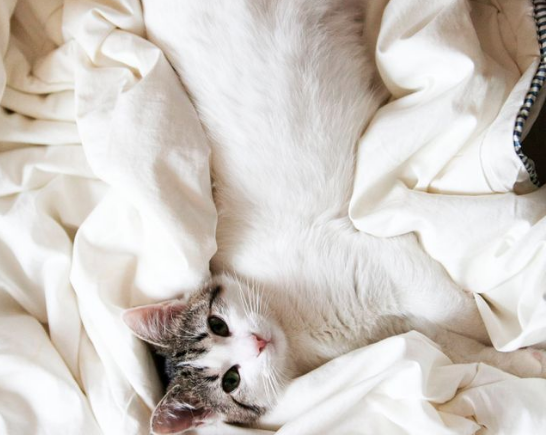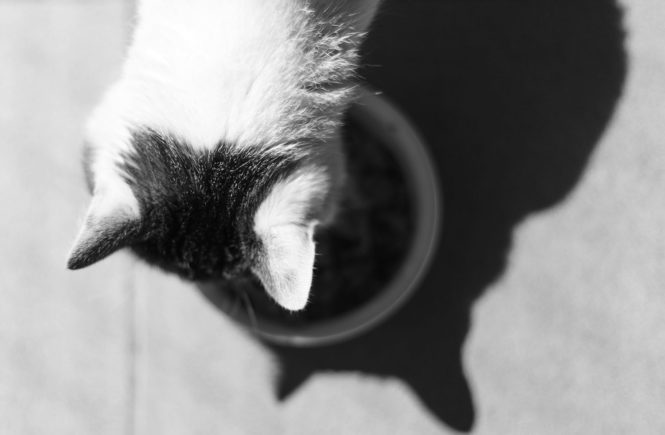Cat doesn’t use litter box
Is this cat using a litter box?
This is the basic question that every person who wants to adopt a cat from me asks me. The answer is always the same – here and now yes, but I cannot guarantee that it will be the same in the future. Each owner is afraid that the cat will be peeing outside the litter box and it is not simple at all to teach a cat to use a litter box. Unfortunately, peeing outside the litter box is one of the most common and probably the most challenging behavioral problems that a new cat’s caregiver must face.
How to prevent such behavior, why is the cat peeing everywhere and how to deal with it?
To understand the basis of the problem, we have to consider a few things. The basic thing that we need to realize is the fact that cats are not malicious and this is the most common stereotype. When cats act against the owner’s wishes they immediately get the “spiteful” tag. Once and for all I wanted to say that CATS DO NOT DO ANYTHING SIMPLY OUT OF SPITE. All the unwanted behaviors usually have an explanation and it is our undeniable duty to find the cause of such behaviors. There may be millions of reasons but there are a few that occur most often.
Why is the cat peeing outside the litter box?
Inflammation of the urinary bladder
To check if your cat is struggling with an inflammation of the urinary bladder, you must get his urine and take him to the vet. Very often cats do not feel well, have cystitis or other ailment, and the only way they show it is by peeing outside the litter box. Unfortunately, cystitis is quite a common problem in cats, considering that they are peeing to the same litter all the time. In addition, the diet which is based on dry food only is not favorable and many cats only get dry crunchies in their bowls. In addition to peeing outside the litter box, you can also notice an increase in the frequency of peeing. It is also a very clear symptom of this disease. Cat that pisses everywhere can just be a sick cat so do not wait too long and go to the vet.
Good litter
Check whether your cat likes the litter you are currently buying or have you changed the type of litter recently or maybe a manufacturer? Litter may have a smell that may be irritating to your cat. Sometimes another type of litter although produced by the same company may be unacceptable to your cat. Silicon litter may have too small or too large granules that can hurt cat pads or enter between the pads and the cat may not want to step on it. The cat ends up peeing in the house because he is trying to avoid the pain which he experiences upon entering the litter box.
Too rarely cleaned litter box / litter changed
Cats are very clean animals. Dirty litter does not encourage them to use it, which is why they often choose clean bedding instead. The litter box should be cleaned daily, if not more often, and the whole litter should be replaced every week or two. When exchanging litter, the box should be washed to eliminate the unpleasant odor and kill bacteria and viruses.
Too small / too large litter box
Cats grow, get sick and get old. Not always the litter box they have been using until now must still be good. Older cats may, for example, start to suffer from joint pain, and getting into the existing box may become too much of a challenge for them. Young cats grow up and, therefore, need larger litter boxes.
Covered litter box
The lid on the covered box – oh yes, covered litter boxes are unfortunately quite a challenge for many of our cats. They are comfortable for people, but not quite for cats. Some do not have problems with them, but others just do not want to enter them. It happens that a cat starts peeing outside the covered litter box after a few years of using it. For us it is not logical, but cats are not people and behave differently. Anyway, if you have a covered litter box and your cat is peeing at home, the first thing you do is take off the lid and see what happens.
Something appeared above the litter box
For example, a towel rack in the bathroom, a picture on the wall, shelves – the cat may have the impression that when he enters the litter box, something will fall on his head. Pissing cat likes to have peace, which is why it is often recommended to put the litter boxes in places isolated from everyday life, but where the cat can easily get in, stretch out and where there is air movement. If we hang something over a litter box, for a peeing cat, it can be an unstoppable barrier – look around and check if something like this has appeared in the proximity of the litter box.
Trauma
The cat may have been traumatized / had a bad experience with the litter box – for example, he entered the litter box just when a firecracker broke out outside the window, and it scared him so much that he does not want to enter the box anymore because he linked the two situations. Cats very well link stimuli with the situation – do your cats also run to the kitchen the moment they hear the food cupboard open? Or as soon as they hear that you are pulling out the vacuum cleaner, are they hiding in the sofa? It can be the same in this situation – cats are sensitive creatures. We may not even notice it, but let’s be aware that this situation could have happened.
Changes in cat’s life
Has your cat’s life changed somehow recently, for example, maybe you moved the chair on which he loves to sleep, are you feeding him at the same time, have you moved to a new apartment … Cats just like small children like routine. Changes in their daily routine may be stressful for them and the result could be peeing outside the litter box. The cat can start doing his business outside the litter box not only due to one-time changes, but also because several things have changed in his life. Let’s try to be forgiving and make changes gently to minimize stress as much as possible.
The cat is peeing outside the litter box when someone visits the house
Maybe your cats are afraid of children and some have recently visited your house? Perhaps you had a guest with a low tone of voice and such a voice makes your cat nervous? Try to see if the cat is peeing while someone comes to your house. If so, try to reassure your cat to even out his mental condition. The way to proceed depends on the situation and the character of the cat.
How to teach a cat to use a litter box
There is a lot to say in this regard, but when I am explaining to someone how to deal with a peeing cat, I always tell them to imagine that they are a young parent and a cat is their child. Unfortunately, cats are often taken away from the mother too early and unfortunately they often spend their childhood outside, where there is no space limitation and the entire floor area can be a litter box for them. Therefore, ‘closing’ the cat in four walls and teaching him to use the litter box, unfortunately, often resembles attempts to teach the child to use the pot. The young cat needs to be put in a litter box and shown that it is a place where he needs to do his business. Luckily cats have a natural need to cover their droppings, which is why the litter boxes are perceived by them as a place to pee. Unfortunately, small cats while playing and running around often forget and they do not reach the litter box in time and pee outside instead. Therefore, at the beginning of your adventure with a cat, it is a good idea to set up several litter boxes throughout the house, so that one is always close by. With time, of course, you can reduce their number, while observing the behavior of the cat. If you notice that a cat is peeing in a wrong place, take him from there immediately and put him in the litter box. Do not let him do it, for example, on bedding, but at the same time, try to remain calm. If you start shouting at the cat, spraying him with water or doing other things that only release your frustration – you will only make matters worse. Remember not to shout at your cat or do anything that would cause him stress, especially while he is peeing. I will write about teaching cats and how to work with them in another post.
Here are the two small “pissers” with whom at the beginning of our joint adventure, I had to go through many wet beds, wet ‘accidents’ during play and wet cots. Was it worth it? Without a doubt it was.
Pissing and marking the area
Males mark the area – definitely yes. Females mark the area? Yes of course! Much less often, but it happens also in the case of females. Do not be fooled by the fact that the cat should have six months to be castrated. Each cat, just like a human being, is different. Each body matures at a different pace. It depends on genetic conditions, the environment and many other factors. If your male or female cat starts to do their business outside the litter box before the age of six months, you must take them for castration. I know vets who will tell you that it’s too early, but please – do not listen to them. Do not let hormones start raging in the blood of your pet, because it will result in your cat pissing everywhere long after the surgery. Remember that the surgery alone is often not enough for the cat to stop peeing outside the litter box. A ‘moment’ has to pass, a “moment” that sometimes lasts a few days, and sometimes a few weeks, for the hormones mentioned before to stop swimming in the blood of your cat.
How to get rid of the smell of cat urine – means to neutralize the cat’s piss
There are many products on the market, but remember that getting rid of the smell of urine is just fighting the effects, and you have to work on the cause. If, however, you already know how to deal with the peeing cat and you can help him, help yourself and buy something that perfectly neutralizes the smell of cat’s piss. Here are the measures that worked in my case:
- Trixie – stain remover
- Benek – odor neutralizer
- Trixie first spray with this product to remove stains
- Benek -then use Benek to get rid of the unpleasant odor. In my case it always worked perfectly, in contrast to other chemicals, after which I had the impression that I live in a dentist’s office.
- Virkon – the only chemical on the market that can eliminate bacteria and viruses. After each transfer of a new cat, I spray the entire transporter in order to get rid of the potential danger.
If you followed the advice from this article and your cat is still peeing everywhere, I would advise you to speak to an animal behaviorist who will help you deal with this problem. Sometimes it happens that a person staying with an animal cannot see as much as a neutral observer.
Remember that eliminating the root cause of the problem – whether pissing outside the litter box or other tiring behavior – is just the first step to success. The most important thing is to act quickly in order to prevent the behavior from becoming a habit. If a given behavior becomes a habit, you will not only have to work on dealing with the cause, but also on getting rid of the habit, which is way more difficult. Therefore if you cannot deal with the issue yourself, talk to an animal behaviorist who will help you and will make life better for you and your pet.




